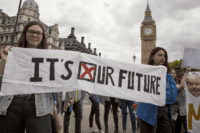
Votes at 16 key to youth engagement
In the latest in a series of articles on youth political engagement, Labour's Yvonne Fovargue MP calls for a greater provision of citizenship classes and a reduction in the voting age.
It's perhaps easy to forget that the voting age hasn't always been 18. Before 1969 it was 21. In fact, when women first got the vote after the First World War it applied only to those aged 30 or over. The simple fact is there is nothing particularly magical about reaching your 18th birthday, even if it feels like there is at the time.
In many ways 16 is much more of a threshold, more of a coming-of-age. At 16 you reach the age of sexual consent. You can get married. You can leave home. At 16 you get your National Insurance Number and can work full time if you have left school. You can join the army and fight for your country. All this and more. And yet you cannot vote.
Some people may argue that you lack the maturity and sophistication to make such important choices at this age. Some argue that young people are simply not engaged in the kinds of issues that decide elections, that they are more interested in having a good time than in discussing the NHS or pensions.
But I disagree. Young people can be passionate about many subjects, not least Brexit and climate change and many thousands of school children have taken to the streets in the past few years to make their feelings clear.
They are also much more clued up than many realise. For example, I have had many conversations over the years with the students at Winstanley Sixth Form College in my constituency and the level of insight and curiosity they showed was at least the equal of constituents twice or three times their age. Frankly, after debating with them it was impossible to justify their disenfranchisement from the political process.
It is not that I am cavalier about who gets the vote. Quite the reverse. The vote is a precious thing and we should cherish it. Our ancestors fought long and hard to achieve it and we should never forget their sacrifice.
2018 was the 100th anniversary of women finally being included in the suffrage, and the 90th anniversary of women achieving it on the same terms as men. Hundreds were imprisoned and force-fed after going on hunger strike. 2019 is the two hundredth anniversary of Peterloo, the massacre in which around twenty people died and perhaps 700 were injured as they demonstrated for universal suffrage and parliamentary reform.
Young people need to know about these events and their importance to the political history of this nation, and many do. Schools are adept at teaching these subjects, whether as part of the history curriculum or in citizenship lessons.
But schools could do more. I would argue that if we are to grant the vote to 16 year olds – and I am very much in favour – we need to do more to prepare them for the issues and choices they face at the ballot box. I am not talking about party politics, but about how Parliament works and the kinds of decisions we as MPs make and why we make them. Citizenship classes are the ideal vehicle for such work.
It's not that I think 16 and 17 year olds are not up to the task of making up their own minds in an election. But wouldn't it be good if we could combine an expansion of the electorate with a real effort to ensure that future generations are better informed of what is at stake than their parents and grandparents?

Yvonne Fovargue a former Labour MP for Makerfield and a former Shadow Minister for Local Government.














